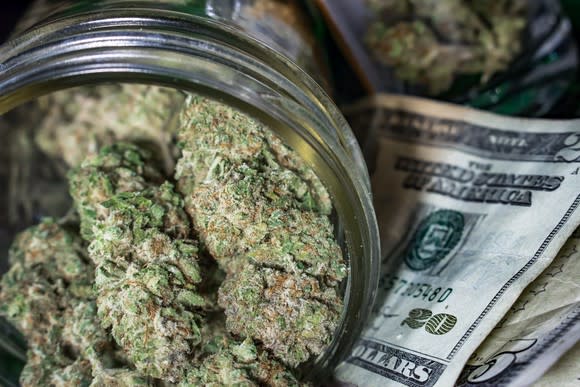Surprise! The First-Ever Marijuana ETF Has More Than Doubled
Sure, cryptocurrencies have been getting most of the glory of late, but few if any publicly traded stocks have outperformed like marijuana stocks have over the past year.
It's not hard to figure out why investors have been piling into marijuana stocks, either. Regardless of whether you prefer the growth estimates from ArcView, GreenWave Advisors, Marijuana Business Daily, or Cowen & Co., the expectation is all the same: consistent double-digit growth for years to come. Thus, even with pot stocks surging by a triple-digit percentage in some instances, they might still be inexpensive given their triple-digit sales growth potential.

Image source: Getty Images.
Both expansion and perception continue to play a key role in fueling this marijuana growth engine. Mexico legalized medical cannabis in June of last year, while Canada is working on legislation that would OK the sale of adult-use weed beginning in July 2018. Within the U.S., 29 states have given the green light to medicinal cannabis since 1996, with voters in eight states approving the sale of pot to adults since November 2012.
In terms of perception, a record number of adults in the U.S. either want to see marijuana legalized nationally, or at the very least OK'd for medical patients.
Investing in marijuana stocks remains risky business
However, despite these catalysts, investing in the marijuana industry comes with a number of risks. For example, it's still a Schedule I substance in the United States, meaning it's entirely illegal and on par with drugs like heroin and LSD. As we saw last week with Attorney General Jeff Sessions' announcement that the Cole memo would be rescinded, the cannabis experiment could end at a moment's notice, whether businesses are ready or not.
Also, since it's a federally illegal substance, businesses that operate in the marijuana industry are often unable to access basic financial services, including something as simple as a checking account, and they're typically excluded from taking normal business deductions as a result of U.S. tax code 280E. This leaves pot businesses to pay an effective tax rate that can climb to as high as 90%. That's not very investor-friendly.

Image source: Getty Images.
There's also a massive black market that's doing whatever it can to undermine legal channels. As of the end of 2016, $46.4 billion in North American weed sales was a result of the black market, compared to just $6.9 billion for legal pot transactions. The black market has no infrastructure to support and no taxes to pay locally or to the federal government. While it is illicit, the lower price of black-market marijuana creates a genuine long-term challenge for cannabis companies that play by the rules.
It's risks like these that make buying individual marijuana stocks especially risky.
Thus entered the Horizons Marijuana Life Sciences Index ETF (TSX: HMMJ), stage left.
News flash: The world's very first marijuana ETF has more than doubled since inception
Introduced to the trading world in Toronto on April 4, 2017, the Horizons Marijuana Life Sciences Index ETF offered a way for investors to benchmark their investment to the North American Marijuana Index, and in the process diversify their holdings to more than a dozen pot stocks. Since its inception date, this cannabis ETF has expanded to 28 holdings, as of Jan. 4, 2018.
Viewed as potentially gimmicky from the get-go, this very first marijuana ETF has proved skeptics wrong. As of this past Friday, Jan, 4, the Horizons Marijuana Life Sciences ETF had more than doubled since inception (up 121%).
Why such a convincing move higher? Though assets in the fund have been spread around, huge moves higher in Canadian marijuana stocks like Canopy Growth Corp. (NASDAQOTH: TWMJF)(up 247% in 2017), Aphria (NASDAQOTH: APHQF) (up 292% in 2017), and Aurora Cannabis (NASDAQOTH: ACBFF)(up 344% in 2017), which were the top-performing marijuana stocks last year, are primarily responsible.

Image source: Getty Images.
A number of Canadian growers have already been delivering positive EBITDA (earnings before interest, taxes, depreciation, and amortization) or marginal full-year profits solely on the basis of medicinal cannabis sales in Canada. But the real excitement is surrounding the potential for adult-use legalization this coming summer. If approved, Canada could see up to $5 billion in added annual sales once fully ramped up. That would lead to a surge in demand that could shoot sales higher for the largest Canadian growers by triple digits.
This aforementioned trio is investing heavily in the event of adult-use legalization. Canopy Growth has 2.4 million square feet of growing capacity under construction or in development in British Columbia, with the option of securing another 1.7 million square feet in the region. Meanwhile, Aphria has a four-phase growth project slated for completion in Jan. 2019 that'll total 1 million square feet of capacity and allow for 100,000 kilograms of annual production. As for Aurora Cannabis, its highly automated Aurora Sky project is expected to be finished in mid-2018. When complete, this 800,000 square foot facility can also produce around 100,000 kilograms annually.
Long story short, as long as the Canadian pot industry keeps firing on all cylinders, the Horizons Marijuana Life Sciences Index ETF may offer additional upside.
More From The Motley Fool
Sean Williams has no position in any of the stocks mentioned. The Motley Fool has no position in any of the stocks mentioned. The Motley Fool has a disclosure policy.

 Yahoo Finance
Yahoo Finance 